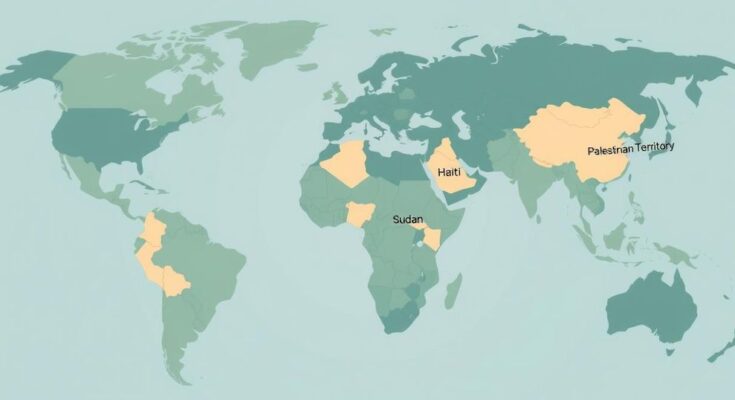The humanitarian crises in Gaza are escalating due to ongoing violence and a blockade, leading to severe casualties and mass displacements. In Haiti, a cholera outbreak is worsening amid instability and lack of resources. The Democratic Republic of the Congo is grappling with increased violence affecting humanitarian efforts, while conditions in Sudan’s displacement camps continue to deteriorate, requiring urgent aid interventions.
The situation in the Occupied Palestinian Territory, particularly in Gaza, has significantly deteriorated, with ongoing attacks leading to numerous casualties and infrastructure damage over three consecutive days. The UN Relief and Works Agency for Palestine Refugees (UNRWA) reported the death toll among its staff has risen to 284 since October 7. Displacement is rampant, with over 68,000 people forced to flee their homes due to evacuation orders, compounded by ongoing hostilities from Palestinian armed groups.
In North Gaza, initial displacement is noted in Beit Lahiya, coinciding with the reported onset of the Israeli ground operation. Under-Secretary-General for Humanitarian Affairs, Tom Fletcher, lamented the dire conditions forcing families to flee amidst constant bomb threats, condemning attacks on designated UN facilities. He underscored that civilians and UN personnel must not be targeted, calling for accountability and an end to the aid blockade.
The blockade has drastically reversed humanitarian gains, inhibiting access to food, medicine, and essential supplies. The UN warns that without urgent re-opening of aid streams, bakeries may close due to supply shortages, exacerbating food insecurity. The UN Population Fund (UNFPA) highlighted that the situation disproportionately endangers women and children, as critical maternal health supplies are dwindling.
Hospitals in Gaza are overwhelmed, treating scores of wounded individuals, but the surge in cases is causing shortages in blood and hospital supplies. The World Health Organization (WHO) previously delivered essential medical materials, while UNFPA has initiated emergency deliveries for pregnant women. Despite security issues leading to activity suspensions, humanitarian partners strive to meet the immense needs amidst increasing risks.
In Haiti, OCHA expresses alarm regarding the cholera outbreak, with over 900 suspected cases reported since the beginning of the year. Data indicate that security challenges have hindered health response teams, particularly in the Port-au-Prince area, risking undetected community transmission. The Ministry of Health, alongside WHO, is deploying resources to address the outbreak but is met with insufficient funding, severely limiting essential service delivery.
Concerns are also rising in the Democratic Republic of the Congo, where violence in Ituri province has prompted humanitarian groups to suspend activities, risking the welfare of approximately 300,000 people. Escalating hostilities have produced significant civilian casualties and hindered access for critical aid. Displaced populations are unable to return home due to ongoing clashes, underscoring the chaos in the region.
In Sudan, the North Darfur displacement camp’s conditions are alarming, as armed groups block essential supply routes, notably affecting water delivery and health services. Humanitarian agencies report that the need for water is critical, with residents facing long wait times to secure supplies. Meanwhile, the ongoing violence has caused widespread displacements, further compounding the humanitarian crisis in the region.
OCHA emphasizes the urgent need for a ceasefire to facilitate unhindered access to humanitarian aid, advocating for adherence to international humanitarian law to protect civilians from ongoing conflicts.
The unfolding humanitarian crises in the Occupied Palestinian Territory, Haiti, the Democratic Republic of the Congo, and Sudan demand immediate international attention and action. In Gaza, continuous violence and a blockade are exacerbating suffering, with an urgent need for humanitarian aid access. Haiti faces a growing health emergency due to cholera amid insecurity, while escalating violence in the DRC is placing vulnerable populations at severe risk. Lastly, conditions in Sudan’s displacement camps necessitate prompt humanitarian interventions to alleviate critical shortages. An immediate response is essential to protect civilian lives and restore essential services.
Original Source: www.unocha.org




